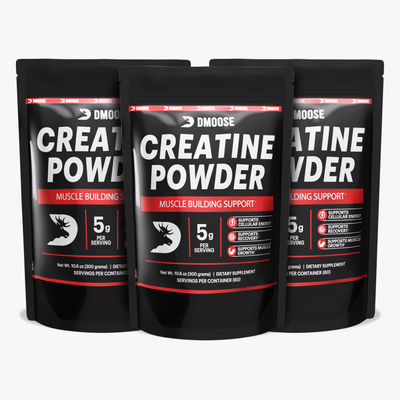Creatine is one of the most popular supplements for muscle growth and performance, but are you taking it at the right time?
Many fitness enthusiasts get caught up in the idea that simply adding creatine powder to their routine will automatically deliver results,
But in this post, we’ll break down the science of when to take creatine monohydrate powder, before or after your workout, to help you get the most out of every rep and set.
Let’s make sure you’re not just supplementing, but optimizing your efforts for peak performance. The truth is, when you take it matters just as much as how much you take.
Why Should You Take Creatine?
Creatine is a go-to supplement for many athletes and fitness enthusiasts. And for good reason. Its primary benefit is its ability to increase muscle mass. It does this by supplying your muscles with the extra energy they need. This allows you to lift heavier weights, push through tougher workouts, and build more muscle over time. But the advantages don’t stop there. Creatine also speeds up recovery, letting you train more frequently and avoid overtraining.
When incorporating creatine monohydrate supplements into your routine, stay hydrated by drinking plenty of water. Be mindful not to overconsume at once. Creatine is a powerful ally in your fitness journey. It offers a range of benefits that help you reach your goals faster and more effectively.
When is the Best Time to Take Creatine?
There are two common times to take creatine, each with its own benefits. Both can help maximize results.
Taking Creatine Before a Workout
Creatine is a compound that helps supply energy to cells. Taking it as a supplement increases creatine levels in muscles. This can lead to better performance during exercise.
Several studies have shown that taking creatine before a workout can help increase your strength and power [1]. Creatine can also improve recovery after exercise, letting you return to your routine faster. If you want an edge during workouts, try taking creatine before exercising.
Taking Creatine After a Workout
Many people take creatine after a workout to help muscles recover. Taking it after exercise helps replenish the body's creatine stores and improves muscle recovery.
Many products on the market contain creatine, including powder. Taking creatine after a workout can be an effective way to boost recovery and promote muscle growth.
The Incredible Benefits of Creatine Monohydrate Powder
Creatine isn’t just for building muscle, its benefits go far beyond that. This powerhouse supplement has proven effects on performance, health, and more. Let’s dive into why creatine deserves a spot in your fitness routine.
Improves Your Muscle Growth
Creatine monohydrate powder supercharges your muscles by supplying extra energy, helping them work harder and longer. This leads to bigger gains over time.
Creatine is a proven way to boost muscle growth. But remember, it works best with a balanced routine of weightlifting and a healthy diet. Just taking creatine alone won’t cut it. [2]
Boosts Your Athletic Performance
Creatine monohydrate helps reduce lactic acid buildup during intense exercise, giving you the edge to push through and improve performance. It’s a favorite for athletes looking to enhance short bursts of energy, like in sprinting or weightlifting. [3]
Studies show that creatine can boost performance, helping you maximize your potential during high-intensity activities. [4]
Gives Your Brain a Boost
Creatine powder doesn’t just benefit your muscles. It also increases ATP levels in your brain, which is crucial for cognitive function. It enhances blood flow, delivering vital nutrients and oxygen to support brain health. [5]
Creatine reduces brain inflammation, which can protect your cells from damage, improving overall brain function.
Protects Your Heart
Creatine supports heart health in multiple ways. It enhances the heart muscle's function, reduces inflammation, and reduces oxidative stress, both of which can lower the risk of heart disease.
Creatine also helps balance cholesterol levels. It can raise “good” HDL cholesterol while lowering “bad” LDL levels, improving heart health over time.
Speeds Up Recovery
One of the most important benefits of creatine is its role in speeding up recovery after intense workouts. It helps reduce muscle damage and inflammation, allowing you to bounce back faster and train more effectively.
Creatine can also help restore your energy stores quicker, allowing for a faster recovery between sets or sessions. [3]
Enhances Hydration
Creatine supplement helps your muscles retain water, improving hydration levels during exercise. Proper hydration is crucial for maintaining strength and performance during workouts. By keeping muscles hydrated, creatine also reduces the risk of cramping and helps maintain peak performance.
When you take creatine, it pulls water into the muscles, allowing them to perform at a higher intensity for longer. [6]
Related Article: What Everyone in the Fitness World Needs to Know About Pre-Workout Supplements
Potential Side Effects of Creatine
- Water Retention: Can cause muscles to swell.
- Stomach Issues: Taking too much creatine may cause upset stomach, nausea, and diarrhea [6].
- Hydration: Creatine can lead to dehydration. Stay hydrated and avoid excessive caffeine or alcohol.
- Gradual Intake: Start with a low dose and gradually increase to minimize side effects.
The Best Way to Take Creatine: Top Tips
- Stay Hydrated: Drink plenty of water to prevent dehydration and help with absorption.
- Mix and Drink Immediately: Combine creatine with a liquid and consume it right away for better effectiveness.
- Start with a Small Dose: Begin with a small amount of creatine and gradually increase to find your optimal dose.
- Avoid Overconsumption: Taking too much creatine at once can cause stomach upset, nausea.
- Consistency Is Key: To see the best results, take creatine consistently with your workout routine.
FAQs
1. What does creatine do for your body?
Creatine boosts energy in muscle cells, improving performance, strength, and muscle growth during exercise.
2. Is it healthy to take creatine?
Yes, creatine is safe for most people. Pregnant women and those with kidney problems should avoid it.
3. What are the side effects of creatine?
Common side effects include water retention, weight gain, nausea, and stomach upset. Stay hydrated and monitor intake.
4. Does creatine help gain muscle?
Yes, creatine improves strength and lean muscle mass, especially when combined with exercise. Learn more.
5. Can creatine be taken every day?
Yes, creatine can be taken daily. Consistent use helps maintain optimal levels in your muscles for better performance.
6. Can creatine cause dehydration?
Creatine can lead to dehydration. Ensure you drink enough water throughout the day, especially when using creatine.
The Bottom Line
Creatine is an absolute game-changer for anyone looking to boost performance, gain muscle, and enhance recovery. With its proven benefits, it’s the perfect addition to any fitness routine. Just remember, consistency is key/ So take it daily, stay hydrated, and pair it with a solid workout plan for the best results.
Check out DMoose Creatine Powder, formulated for maximum muscle support and performance. Whether you’re lifting heavy or hitting a new personal best, DMoose creatine has your back.
Reading List
Article Sources
- [1] Cooper R, Naclerio F, Alvar B, et al. Creatine supplementation with specific view to exercise/sports performance: an update. J Int Soc Sports Nutr. 2012;9:33. Available from: https://doi.org/10.1186/1550-2783-9-33
- [2] Hoffman J, Stout J, Ratamess N, et al. Effect of creatine and beta-alanine supplementation on performance and endocrine responses in strength/power athletes. Int J Sport Nutr Exerc Metab. 2006;16(4):430-46. Available from: https://doi.org/10.1123/ijsnem.16.4.430
- [3] Kreider RB, Fry AC, Kwon H, et al. Effects of creatine supplementation on performance and training adaptations. Mol Cell Biochem. 2003;244(1):89-94. Available from: https://doi.org/10.1023/A:1022465203458
- [4] Ostojic SM, Ahmetovic Z. Gastrointestinal distress after creatine supplementation in athletes: are side effects dose dependent? Res Sports Med. 2008;16(1):15-22. Available from: https://doi.org/10.1080/15438620701693280
- [5] Riesberg LA, McKay L, Westerholm D, et al. Beyond muscles: the untapped potential of creatine. Int Immunopharmacol. 2016;37:31-42. Available from: https://doi.org/10.1016/j.intimp.2015.12.034
- [6] Roschel H, Gualano B, Ferreira J, et al. Creatine supplementation and brain health. Nutrients. 2021;13(2):586. Available from: https://doi.org/10.3390/nu13020586












